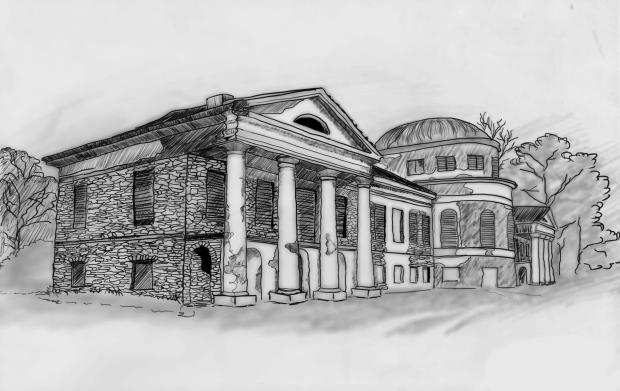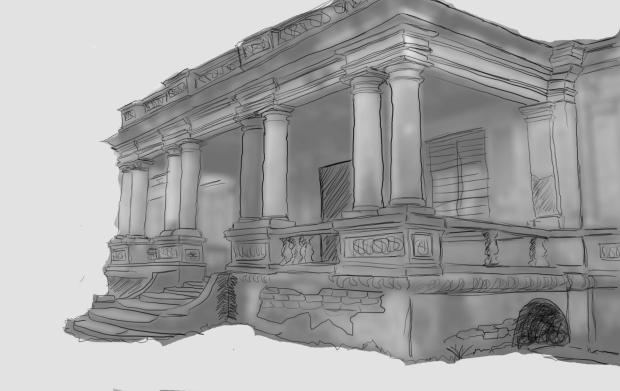“Babel” Diary Page Monologues
15th October 1829
The mood in Paris is grim; as grim as I’ve ever seen it. On any other day I would have been devastated at being forced to resign my commission, but if it means I am released from my post at the city, I’ll gladly accept it. There is an ugly cast to the people that is all too reminiscent of those blood-soaked days of 1790. I have little desire to have my head chopped off, and being an “artisto” officer in a city of revolutionary sentiment is not wise. Caroline is thrilled, of course. We celebrated her 25th Birthday only a week ago, but she’s already anxious to leave. To see her distressed so, unsettles me; she always loved the vitality of the city in the days of Napoleon, but now she fears it. And so do I.
29th October 1829
We arrived this evening at the House in the mountains. The Estate hasn’t been inhabited for nearly 30 years, but it seems remarkably unchanged by time but I’ve sent for additional servants to open up the house. I confess I am still unnerved by it’s dark spaces and quiet menace – ever since I was a child, I have disliked this house with an intensity that surprises me. But one can’t live in the past; this house is all that I have left to my name, and I am now, whether I like it or not, it’s master.
1st November 1829
Unlike many of my contemporaries, at least I’m not short of work to occupy myself with. Ever since I designed a sighted musket for the Imperial Guards’ Voltigeurs, I have received four commissions from an collection of gunsmiths and military requisition officers. They pay well, and allow me to continue my study of clockwork automation. Retirement…is not as bad as I had feared it would be.
12th November 1829
We found it quite by accident. Grantaire, my new head of household, was cleaning the clock in the Library when he discovered a secret entrance-way hidden in the walls. In a recessed alcove, there is a ladder, which leads up to the most bizarre space, somewhere between a carpenter’s workshop a machine-smiths laboratory. I’ve sworn Grantaire to secrecy – it shall make the perfect little hiding place where I can work on my designs in peace. And if what they say about another Revolution is true, then having a hiding place may prove to be unexpectedly useful.
1st December 1829
If I had known what life in the countryside would be like, I would have resigned my commission years ago. The life of a country aristocrat suits Caroline well, though I suspect the glow that she gives off isn’t just the mountain air. The staff adore her, and even the villagers seem to have overcome their distrust of the nobility, and have warmed to her kind heart. Were that they would do the same for me. I admit to feeling a pang of guilt; here I am enjoying a life of privilege while France teeters on the brink of Revolution yet again. I hear that Paris is in turmoil; there is talk of uprising, men and women parade the streets wearing Red, White and Blue in open defiance of our King, Charles the 10th. We should be safe here until the embers of revolution burn out.
28th May 1830
A girl! A beautiful baby girl! By heaven, I never thought I could be so happy. Caroline is exhausted, but well. We have decided upon the name Madeleine. She has her mother’s eyes.
3rd September 1830
The townsfolk say it was brought into the valley by people fleeing the turmoil in the cities. The entire town has been struck down by a terrible illness, almost as virulent as the infections I saw run rampant through the Grande Armee. Thankfully, most of the staff have remained immune, but Caroline has not been so lucky. Her little sojourns into the town must have exposed her to the flu, for she is now suffering a high fever, and what is worse, so is Madeleine. The local doctor is clearly overwhelmed, so I have sent for a Monsieur Villeneuve, a physician who served my family back in the Paris. But if rumor is to be believed, the Capital is in open revolt, so he may be some time in coming, if he is able to at all.
1ST October 1830.
Madeleine passed died last night, and our world is cold and gray. Poor Caroline has been hit far harder than I; her grief-wracked sobs fill the house, and break what is left of my heart. Her condition grows worse with each passing day. Villeneuve was unable to attend, and the doctors he sent in his stead have no answer; one says warmer climes, the other recommends a medicinal tea made form ingredients unobtainable on the continent. There must be an alternative I have overlooked, some remedy. Anything. There is a gypsy camp in the woods in the valley, they may know of some cure-all. As a god fearing man, I have already refused to stoop to common witchcraft, and I do not intend to do so, but time is not on my side.


